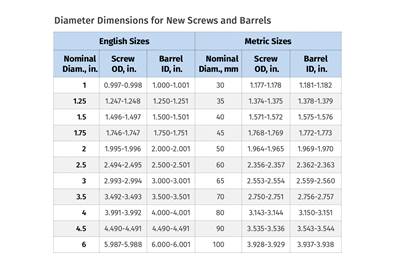Not Such Good Advice Anymore?
The Plastics Academy of St.
The Plastics Academy of St. Clair County, Mich., closed last year after more than 10 years of training high schoolers in the area for jobs in plastics processing. Plastics job training had been part of the County's vocational offerings for 15 years before the program changed its name from the Skills Center to the Plastics Academy.
Many graduates did well in the challenging environment of automotive injection molding. They include George Benjamin, supervisor of the Jordan Creek Plastics facility of Sarnamotive Blue Water, Inc. Benjamin, in turn, helped train later generations of high school interns, and he hired a number of them because they came better prepared than other job applicants.
Kids from nine regional high schools attended the St. Clair County program, where they took classes like machine maintenance and die setting during the school year. They also learned to run an injection machine owned by the County.
The plastics program included real work experience, starting with a summer internship after junior year in high school at a local molding plant, where interns were paid $8 to $10/hr as machine operators. In the fall of senior year they stayed on at the plant and learned tooling and quality control. "If students showed any interest or aptitude at all, they were offered a job when they graduated," says the program's School-to-Work coordinator, John Wunch.
In the late 1990s, enrollment in plastics was dropping while other vocational programs—like PLC programming, arc welding, healthcare, and culinary arts—flourished. By the spring of 2003, plastics enrollment fell so low that the plastics program was terminated, except for a few courses like machining, welding, and CAD.
Wunch feels that the apprenticeship model suffered as local molders trimmed their workforces to cut costs. "With ‘lean manufacturing' they didn't have time to train the kids. They would just say, ‘Mop up that oil,'" he recalls. "Students complained that they weren't learning anything."
End of a ‘grand design'
In the late 1970s the program was started by owners of four family-run automotive molders—Pine River, Blue Water, Huron, and Mohawk. Molders back then had difficulty getting good operators. "We had a grand design," recalls Charles Cronenworth, one of the founding four molders and president of the board of the County vocational training program. "The plan was to train plastics processing leaders with two years of plastics courses at the high school level, two years in St. Clair County Community College's plastics program, and then two years in the plastics program at Ferris State University for a BS degree." Only two or three students completed the whole six years, but those who took even part of the program, like supervisor Benjamin, did well in subsequent employment, Cronenworth says.
Since that time, three of the four founders' molding companies have been sold to bigger corporations. Some plants in the area have closed, so skilled operators are readily available. To cut costs, some molders now hire operators and maintenance people part-time through temporary-worker agencies. So while molding jobs are still available, the urgency to attract employees is gone.
It's also a different workforce today. "The young people we've been hiring just want a paycheck and benefits—not a career," says Kevin Drummond, owner of Butler Plastics in Marine City, Mich., who hired a number of Plastics Academy graduates over the years. Butler has a state-registered apprenticeship program and offers to pay for its employees to take community college courses. "I've had young men start classes, but I've never had anyone finish. At that age I'd have killed for an offer to pay for school."
Meanwhile, parents read about manufacturing jobs going to China and don't want their kids training for a job that might disappear, says Robert Lozon, owner of Precision Die & Machine Co., St. Clair, Mich., and a former Academy board member.
The Academy's injection machine was sold and the vocational program has been renamed the Industrial Technology Academy. New courses on digital media and public safety have a waiting list. "But we haven't had anyone come to us lately wanting plastics," Wunch says.
Read Next
Troubleshooting Screw and Barrel Wear in Extrusion
Extruder screws and barrels will wear over time. If you are seeing a reduction in specific rate and higher discharge temperatures, wear is the likely culprit.
Read MoreAdvanced Recycling: Beyond Pyrolysis
Consumer-product brand owners increasingly see advanced chemical recycling as a necessary complement to mechanical recycling if they are to meet ambitious goals for a circular economy in the next decade. Dozens of technology providers are developing new technologies to overcome the limitations of existing pyrolysis methods and to commercialize various alternative approaches to chemical recycling of plastics.
Read MorePeople 4.0 – How to Get Buy-In from Your Staff for Industry 4.0 Systems
Implementing a production monitoring system as the foundation of a ‘smart factory’ is about integrating people with new technology as much as it is about integrating machines and computers. Here are tips from a company that has gone through the process.
Read More






.png;maxWidth=300;quality=90)














